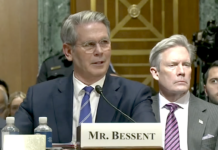
(Georgia Recorder) — Gun safety advocates representing nonprofits, law enforcement, and mental health specialists met Thursday morning in a Georgia Senate committee studying gun safety to discuss the urgent need to pass laws protecting young people in the wake of Wednesday’s deadly school shooting in Barrow County.
The Senate Study Committee on Safe Firearm Storage meeting began with lawmakers expressing dismay and outrage over the shooting at Apalachee High School, which left two students and two teachers dead and another student charged with their murders.
Colt Gray, 14, was arrested on the Apalachee campus minutes after local and state law enforcement stormed the school. He is accused of firing bullets from an AR-15 rifle with a collapsible stock police say was used to kill 14-year-olds Mason Schermerhorn and Christian Angulo and math teachers Christina Irimie and Richard Aspinwall.
And late Thursday, the Georgia Bureau of Investigation announced that Gray’s father, Colin Gray, 54, was arrested on multiple charges, including four counts of involuntary manslaughter, two counts of second-degree murder and eight counts of cruelty to children. “He knowingly allowed his son, Colt, to have the weapon,” the GBI said in a news release.
The committee meeting was scheduled prior to Wednesday’s school shooting that captured the nation’s attention. Democratic Sen. Emanuel Jones of Decatur, who chairs the study committee, decided not to postpone the meeting for the group that is charged with the significant undertaking of crafting and helping pass gun safety laws and policies to protect young people from violent and deadly encounters.
Georgia senators and gun safety experts spent two hours Thursday discussing potential legislation, such as offering state tax credits to give people a financial incentive to purchase safes to securely store their firearms, strengthening laws around mental health evaluations prior to firearm purchases and making it illegal for parents who allow minors to access firearms that were kept in an unsecured place.
The committee chair praised Republican Lt. Gov. Burt Jones for forming the committee after years of pushing by Democrats and for the Senate leader’s staff expressing support for the committee during a phone call prior to Thursday’s meeting.
“The timing was unfortunate, but at the same time, we didn’t want to move the meeting because we are talking about the horror attack,” Jones said to a group of reporters Thursday. “And we’re certainly hoping to capitalize on the tension from the event that happened at Apalachee High School and to reassure the citizens of our great state, and not just Georgians, but around the country, that we are singularly focused on this issue.”
More than 300 children have been treated in Georgia’s emergency rooms for a firearm wound this year, according to the state chapter of the American Academy of Pediatrics. Georgia’s law allows adult gun owners to carry their weapons openly without a permit and imposes no safe storage requirements to keep guns out of the hands of minors.
Heather Hallett of Georgia Moms for Change says the state needs to take action on its lax gun regulations that could improve public safety and safeguard gun owners’ rights at the same time.

There are no universal background checks required for gun purchases in Georgia, nor are there strong enough laws punishing adults when minors gain access to their weapons, she said.
“We’re a state of gun owners, and most gun owners, Republicans and Democrats, agree that there are common sense solutions and regulations that can save lives and also protect our Second Amendment rights,” Hallett said at the state Capitol hearing. “This is not an either-or situation, and for the sake of those families in Winder, I beg that all of us take a step away from whatever forces pull us to political polls and instead look at the problem of gun violence from a public health perspective again.”
“We’re unique in this sense; the states that have the lowest rates of gun violence universally employ evidence-based regulations that create this framework for safe gun ownership that we’ve been talking about in Georgia,” Hallett said.
Calls rang out across the state after news reports confirmed the accused shooter is too young to own a gun for Georgia to adopt laws enacted in states like Texas and Florida that hold adults accountable with criminal and civil penalties if a minor commits a crime with an unsecured firearm. Jones said he would support another attempt to get the law passed.
Jones recommended that Georgia legislators consider closing what he says is an archaic gun ownership and mental stability law that requires a person to be admitted to a mental health hospital before being prevented from owning a firearm.
“Everyone (now) is treated at home with medication or in a hospital setting temporarily, and then they get discharged… and I think we can do a lot of work, particularly having papers pre-screened prior to getting a permit to buy a weapon,” Jones said.
Everytown For Gun Safety published a report in June 2022 on the rising suicide rates among young people in America, which saw Georgia’s rate increase by 90% during the previous decade. The report says that about 80% of suicides committed by people ages 18 and under involved firearms that belong to a family member.
In 2022, 1,050 Georgians under the age of 18 committed suicide with guns, which accounted for 65% of the total suicides in the state, according to Chelsea Piatt, associate area director of the Georgia chapter for the American Foundation for Suicide Prevention.
Reducing suicide rates means Georgia state leaders must invest more in mental health services and enact policies that promote safe storage of firearms, such as unloading the weapons and storing them in a locked location while at home, Piatt said.
She said she supported legislation considering the use of tax credits to promote safe firearm storage, laws allowing for voluntary do-not-sell lists, and mental health pre-screening for gun permits.
“So if you feel like you are struggling, or your son or daughter is struggling, you can go and put their name or your name on a voluntary do-not-sell list for a period of time, and that person will not be able to purchase a gun,” Piatt said.
Democrats called for further steps. State Rep. Michelle Au, a Johns Creek Democrat, achieved a rare victory for gun safety supporters last year when her gun storage bill received a legislative hearing. The measure would have created punishments for gun owners who negligently allow firearms to fall into the hands of unsupervised children if those children harmed themselves or others.
That legislation did not pass, and neither did another bill touted as a compromise, which would have provided a tax credit of up to $300 for gun safety devices like safes and trigger locks.
The Senate panel also heard testimony Thursday from Jordan Murphy, executive director and pediatric nurse practitioner with Girassol Wellness, an Atlanta-based mental and behavioral health care nonprofit. Murphy spoke about her experience helping counsel young people who have survived gun violence committed against their family members and friends and live in high-risk communities.
Firearms are now the leading cause of death for children and teenagers in Georgia, Murphy said.
She called for more intensive gun safety education and comprehensive support for young people who have been affected by gun violence, especially those living in high-risk areas.
“What actually happened is as I started treating children, they were coming in for stress-related concerns,” Murphy said. “I’ve heard children tell me that they were afraid to walk in the halls during school and when class was in session, they didn’t want to go to the restroom because they were worried about something happening.”
Sen. Frank Ginn, a Danielsville Republican, said he wants the study committee to continue protecting Second Amendment rights while coming up with ideas that better address mental illness that can often be an impetus when young people resort to deadly violence.
Biden urges stronger gun control laws
On a visit to western Wisconsin, where he announced a new rural clean energy electrification program, President Joe Biden began his remarks with words of comfort for the victims and survivors of the Georgia shooting and a call for lawmakers to take action.







